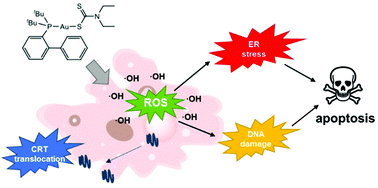Highly cytotoxic gold(i)-phosphane dithiocarbamate complexes trigger an ER stress-dependent immune response in ovarian cancer cells†
Abstract
Ovarian cancer is a highly aggressive disease which is treated by surgery and platinum chemotherapy. However, a significant proportion of treated patients develop resistance to platinum treatment resulting in tumor relapse. Acquired platinum resistance has been recently correlated with activation of pro-survival endoplasmic reticulum (ER) stress responses. We hypothesized that Au complexes that induce severe ER stress might counteract pro-survival cellular attempts leading to the ER stress-mediated apoptosis and reduced platinum resistance. In this work, we prepared a series of highly cytotoxic AuI-dialkyldithiocarbamate complexes and investigated their anticancer potential in ovarian cancer cells. Complexes demonstrated surprisingly low stability in chloroform, resulting in the formation of an Au chain polymer, which also displayed excellent cytotoxicity. Lead complex 2 induced oxidative stress and ER stress-mediated p53-independent apoptosis associated with PARP cleavage and cell cycle arrest at G2/M phase. Importantly, 2 caused the surface exposure of calreticulin (CRT), which is the first step in the activation of cellular immunogenic response.



 Please wait while we load your content...
Please wait while we load your content...